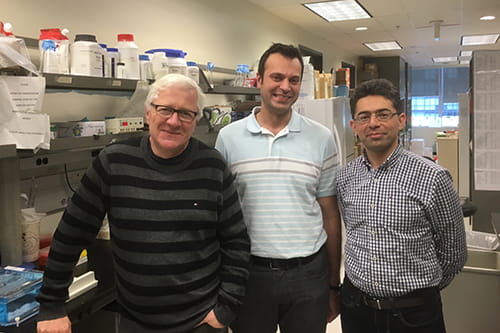In 2024, an estimated 23,600 Canadians will be diagnosed with a blood cancer. Blood cancer is an umbrella term for cancers that affect the production and function of blood cells. Most of these cancers start in the bone marrow where blood is produced. They occur when abnormal blood cells start growing out of control, interrupting the function of normal blood cells which fight off infection and produce new blood cells.
There are 3 main groups of blood cancers – leukemia, lymphoma (such as Hodgkin lymphoma and non Hodgkin lymphoma) and myeloma (also called multiple myeloma).

What causes blood cancer and can it be prevented?
Not a lot is known about how to prevent blood cancers, although the ComPARe study from 2019 showed that excess weight and lack of physical activity could contribute to between 4-10% of some blood cancers, 22% of acute myeloid leukemia is due to tobacco smoking and 36% of Hodgkin lymphoma is due to Epstein-Barr virus.
What is the Canadian Cancer Society doing about blood cancer in Canada?
In the last 15 years, the Canadian Cancer Society has invested $65.7 million in blood cancer research to better understand what causes it, how it develops, how to prevent it, how best to treat it and how to improve the quality of life of people living with it.
Every day, researchers are investigating blood cancers to help make a difference for Canadians affected by this disease.

For Dr John Dick and his team, their recent study funded by generous supporters of the Canadian Cancer Society has shown that it is possible to predict who will develop acute myelogenous leukemia (AML). The incidence and death rate of AML increases with age. In fact, this particular type of leukemia is the leading cause of adult leukemia deaths in Canada.
The international study found that seemingly healthy people start getting genetic changes in their blood cells years before they are diagnosed with AML. The researchers were able to identify early genetic changes that represent the first steps to blood cells becoming cancerous as early as 10 years before an AML diagnosis. These findings highlight the possibility of doing a simple blood test to identify people at high risk of developing AML and intervening early to prevent the disease.
Research like this could change the lives and future for Canadians facing a blood cancer diagnosis.
How is the Canadian Cancer Society supporting people with blood cancer?
No one should face cancer alone. Through our nationwide support system, we help people with all types of cancer manage life with cancer, find community and connection and build wellness and resilience. This support system includes a variety of programs and services such as a helpline, peer support programs and reliable cancer information.
We understand that everyone copes with cancer differently. We’re committed to being there to provide knowledge and support to Canadians affected by cancer as well as their family and friends.
With blood cancer representing almost 10% of all cancer diagnoses in Canada, show your support for research in this area and help more people with blood cancer survive and live their lives to the fullest.
Together, we can be a force-for-life in the face of cancer.
